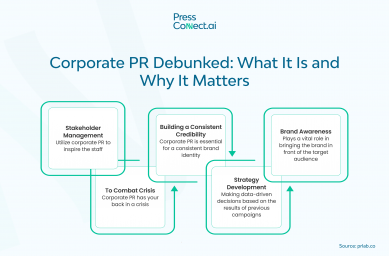Businesses nowadays must differentiate themselves from others in any possible but reasonable way. Businesses must not only speak of their milestones and achievements but must internalize them and their value in concrete action. This growing recognition has increased dependence on corporate PR as an effective means. While dependency on PR campaigns is increasing, the challenges of transversing the complexities are not hurdles-free.
Forecasts show that the U.S. B2B advertising and marketing industry is bound to see continuous growth. Spending on such strategies will amount to USD $69 billion by 2026.
A few missteps bring out the challenges of getting it right during the relentless exploration of digital platforms. The importance of productive corporate PR has never been so highlighted.
What is Corporate PR?
It is all about influencing audiences for business interests. PR incorporates the management of information and sharing of businesses or individual lots.
Corporate PR handles everything an organization has to deal with regarding the flow of information to all its employees and clients, stakeholders, sponsors, and investors. Efficient corporate PR strengthens business identity and thereby helps it flourish. It creates compelling stories that appeal to the audiences and achieve the desired outcome.
Why Corporate PR is Necessary for a Business?
PR distribution is necessary for businesses for several reasons. A few are described herein below:

Stakeholder Management
What happens within the management? Employee loyalty, motivation and good PR can work as a treat for all the investors’ relations. Corporate PR aims to construct a positive and potent relationship between the business and the stakeholders. Employee commitment to the company makes them an ambassador of its mission and vision.
This practice can also increase the brand image, making it more credible for competitors and internal and external investors. Corporate PR enables organizations to incentivize employees and foster others by creating a solid and consistent corporate identity.
Consistency Creates Credibility
B2B PR is the most significant way to create a strong and permanent brand perception in the minds of their audience. A well-researched and thoughtfully planned strategy enables the brand to associate well with people and reap constant credibility. Word-of-mouth and referrals affect their goodwill, thus attracting a larger audience, third party, sponsor, or investor impression that wants to invest in the exact business.
Brand Awareness
Corporate PR helps reach a lot of information that involves products or services for view by their target market. People can understand the business’s positioning among its competitors through various marketing strategies and the value of the products or services it offers in their lives. This aids firms in differentiating themselves from their rivals by portraying corporate executives as thought leaders through their insights, opinions, and experience.
To Counter Crisis
During crises, businesses need a corporate PR team to manage the situation gracefully. The PR team should be able to answer the questions raised conveniently by the public in incidents where the product is not functioning as it was supposed to from features or the service is not as demanded. It is the niche of PR experts to understand, strategize, and transit these. In enacting these strategies, the PR team will be able to redeem the business to the public’s lost trust.
Building Strategy
Creating a formidable corporate PR strategy often requires checking experiments. From this experimentation, a business eventually understands what is expected of its corporate PR. This will enable the brand to know the kind of story the consumer will respond to and build on that to shape the future attitude of the audience toward the brand as a business.
Benefits of the Corporate PR
Benefits related to corporate PR within a business require a strategic and integrated approach so that companies can benefit efficiently from PR for brand awareness, reputation, and relationship building with stakeholders.
All about Brand Image
In its very foundation, corporate PR deals with the governance of information and the framework of pictures surrounding a given company. The perception of a company often makes the difference between success and failure in a world where perception seems just as powerful as reality. A good Corporate PR strategy will project a positive image of the company, outlining and underlining its strengths, values, and successes. As such, it attracts customers, investors, and top talent from which the company will develop and flourish.
Increased Visibility
Another critical benefit that press release services yield is in terms of visibility. The proper media relations, press releases, social media campaigns, and events enable this Corporate PR to bring a company center stage, ensuring that the business stays top-of-mind with its target audience. There is much more visibility in securing new customers and strengthening loyalty amongst the old ones. A visible company is often believed to be an industry leader; hence, credibility increases.
Credibility and Trust
In the business sector, credibility is everything. Enterprises that enjoy stakeholders’ trust have higher chances of success in the long term. Corporate PR helps much in building such trust and maintaining it through messages that convey—without a break—the values of the company, the ethical practices it adheres to, and its commitment to quality. Whether through open and honest communication in crises or using corporate social responsibility activities, Corporate PR builds trust that converts stakeholders into long-term company advocates.
Audience Engagement
The other prominent feature of Corporate PR is audience engagement. Corporate PR facilitates it in a digital world where customers and other stakeholders expect direct and meaningful exchange with the brands. Through social media, blogs, newsletters, and other means of communication, Corporate PR enables organizations to interact with their audience for feedback and to establish a committed community. This interaction brings about an understanding of the audience’s needs and preferences and builds substantial and long-term relations.
What Are the Differences Between Consumer and Corporate PR?
While consumer PR and Corporate PR aim to shape perception and build relations with stakeholders, they differ in their context and target audiences. Consumer PR serves to promote products and services in the public market. It often has more creative, high-interest campaigns that aim at direct sales. The primary role of this area is to influence consumers’ behavior and support a brand’s presence in the market.
In contrast, corporate PR is more concerned with the company’s reputation than promoting products. The communications it embraces hold a far more comprehensive range of stakeholders, such as investors, employees, government bodies, and media. Corporate PR strategies are often more strategic and long-term, focusing on building trust, credibility, and a positive corporate image.
Should Businesses Hire a Corporate PR Firm?
This is a wise decision for many companies, especially those that lack the proper resources and expertise to manage their PR efforts effectively. A Corporate PR firm will offer a great deal of experience, knowledge, and media connections in-house, which can be invaluable in constructing and executing a successful PR strategy.
This is also where a Corporate PR firm can take a somewhat objective view: helping companies navigate complex issues, manage crises, and capitalize on new opportunities. To large corporations or those operating in highly competitive or regulated industries, the strategic insight and execution capabilities that a Corporate PR firm brings make a world of difference in hitting communications marks.
What is an Effective Corporate PR Strategy?
An effective corporate PR strategy dovetails with the company’s overall business objectives in one way or another. It serves to help resolve the particular needs and challenges currently being faced within the company. It should not just be reactive; it should pose a proactive point of view. What follows are the components that make up an effective Corporate PR strategy:
Clear Messaging
The messages issued must be consistent, clear, and appealing while the company value augments its relevance to the targeted message.
Media Relations
Good relationships with key media operators and influencers can help convey the company’s message.
Crisis Management
A well-detailed crisis management plan allows the company to respond promptly.
Measurement and Evaluation
Ongoing measurement of PR activities to determine if they have an effect and then adjusting events as appropriate.
How Press Connect Helps Businesses Build Reputation Through Corporate PR?
Through Corporate PR, firms acquire the capability to build reputation, gain trust, and drive toward success. Press Connect understands the advantages and differences of different forms of PR and develops well-crafted strategies to help companies achieve their business objectives while maintaining a good public image in a world of competition and connection.
The post Corporate PR Debunked: What It Is and Why It Matters appeared first on Press Connect.






